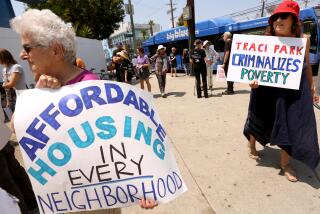Why Go So Far When Lessons of Habitat Can Be Learned at Home?
In June of this year, representatives from the United States will travel to Istanbul, Turkey, to participate in the United Nation’s Conference on Human Settlements, also known as the City Summit. One of the objectives of Habitat II is to address problems many nations experience as a result of rapid urbanization. The expected outcome is an international policy framework to create economically, socially and environmentally thriving communities.
In preparing for this meeting, the U.S. Department of Housing and Urban Development has initiated a series of activities, including the appointment of a national preparatory advisory committee and sponsoring a national competition to select 25 examples of current best practices in the United States that contribute to community building by focusing on affordable housing, poverty alleviation, job creation or environmental regeneration. Los Angeles’ Beyond Shelter program, an organization that stresses immediate return of homeless families to independent living, was one of the winners.
HUD has also held a series of town meetings in Baltimore, Los Angeles and Chicago. The purpose of these meetings has been to bring together diverse citizens to discuss how urbanization is affecting their lives, their neighborhoods, the country and the world. Nine more town meetings are scheduled to be held in Boston; Brownsville, Texas; Atlanta; Oakland; Ames, Iowa; Sarasota, Fla.; Cleveland; Denver; and Seattle over the next several months. The final step in preparing for the June conference has been the creation of a national report focusing on key problems and potential solutions that representatives from other nations will have the opportunity to review and discuss at the summit.
One would be hard pressed to fault the intent of this endeavor, but isn’t it ironic that the focus of attention on creative and innovative solutions to major issues facing metropolitan areas throughout the United States will take place in Istanbul? One wonders what would happen if a similar effort were initiated here at home. What might we learn, for example, if the corporate leaders of Los Angeles would sponsor a best-practice contest designed to select projects or programs that exemplify good examples of workable strategies for reducing income inequality, generating new employment opportunities (particularly for individuals with limited skills and educational opportunities), reducing gang violence and crime, and strategies for demonstrating how the city’s ethnic diversity builds self worth, dignity and positive contributions to the culture of Los Angeles.
Think of the excitement that might be generated if citywide forums were held to identify how average citizens, in concert with civic organizations, business groups and government leaders, could discuss and debate how proposed city policies might affect the quality of their lives. We might learn from this process that many city-supported projects such as the Alameda Corridor, financial incentives for the DreamWorks SKG team or pursuit of a new NFL football team may add little to the quality of life for the vast majority of the city’s residents.
We may also learn that much of the racial tension that exists in the city stems not from gangs fighting over turf, but instead from the inability of different ethnic and racial groups to engage in everyday conversation, in part because of language barriers, but also because of geographic separation. How thought provoking it might be if the mayor challenged our local universities to produce an annual state-of-the-cities report replete with empirical data and maps showing how implementation of various city policies create differential impacts on neighborhoods throughout the city compared to the city as a whole.
Out of this process might come an interesting policy framework for creating a more economically, socially and environmentally thriving Los Angeles. I wonder if the delegation to Turkey will bring us something we can put to use?
More to Read
Sign up for Essential California
The most important California stories and recommendations in your inbox every morning.
You may occasionally receive promotional content from the Los Angeles Times.










